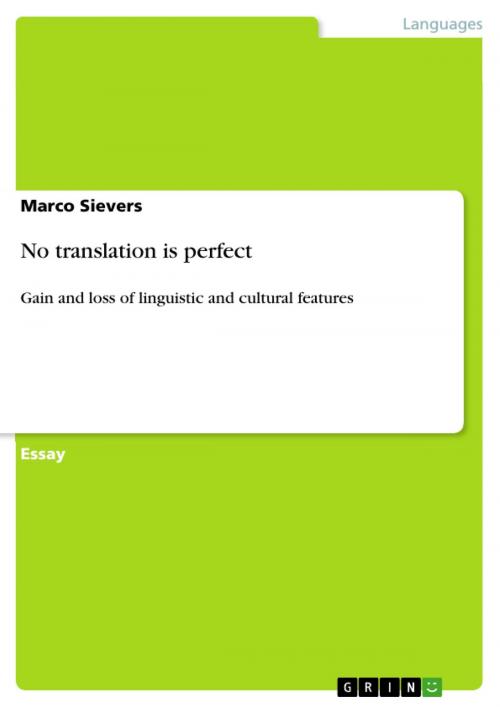No translation is perfect
Gain and loss of linguistic and cultural features
Nonfiction, Reference & Language, Language Arts, Translating & Interpreting| Author: | Marco Sievers | ISBN: | 9783638828567 |
| Publisher: | GRIN Publishing | Publication: | July 12, 2007 |
| Imprint: | GRIN Publishing | Language: | English |
| Author: | Marco Sievers |
| ISBN: | 9783638828567 |
| Publisher: | GRIN Publishing |
| Publication: | July 12, 2007 |
| Imprint: | GRIN Publishing |
| Language: | English |
Essay from the year 2006 in the subject Interpreting / Translating , grade: 2, Liverpool John Moores University, course: Translation Studies, 22 entries in the bibliography, language: English, abstract: The basic assumption of laymen concerning translation is that every word or meaning can universally be translated from one language to another. Their idea of translation is that of a straightforward mechanical process which simply replaces source language (SL) items with target language (TL) items. Some conceptions in translation studies seem to encourage this view, and debates suggest that it is only a matter of the right scope, focus or technique to create perfect translations. The paper at hand will refute this notion. It will prove and exemplify the facts that not everything is translatable, and that a transfer of meaning necessarily involves changes entailing loss or gain of linguistic, cultural and stylistic features (cf. Harvey 2001, 38; Pym & Turk 2001, 274). Translation cannot create an identical TL copy of the SL text, but only permits a relative equivalence to it. A maximal approximation, however, can never be achieved, due to the complexity of language, its dependence on constantly changing cultural norms, and because the human factor. Especially the aspect acceptance by the audience will show that perfection is just an abstract evaluative term, which largely depends on individual taste.
Essay from the year 2006 in the subject Interpreting / Translating , grade: 2, Liverpool John Moores University, course: Translation Studies, 22 entries in the bibliography, language: English, abstract: The basic assumption of laymen concerning translation is that every word or meaning can universally be translated from one language to another. Their idea of translation is that of a straightforward mechanical process which simply replaces source language (SL) items with target language (TL) items. Some conceptions in translation studies seem to encourage this view, and debates suggest that it is only a matter of the right scope, focus or technique to create perfect translations. The paper at hand will refute this notion. It will prove and exemplify the facts that not everything is translatable, and that a transfer of meaning necessarily involves changes entailing loss or gain of linguistic, cultural and stylistic features (cf. Harvey 2001, 38; Pym & Turk 2001, 274). Translation cannot create an identical TL copy of the SL text, but only permits a relative equivalence to it. A maximal approximation, however, can never be achieved, due to the complexity of language, its dependence on constantly changing cultural norms, and because the human factor. Especially the aspect acceptance by the audience will show that perfection is just an abstract evaluative term, which largely depends on individual taste.















